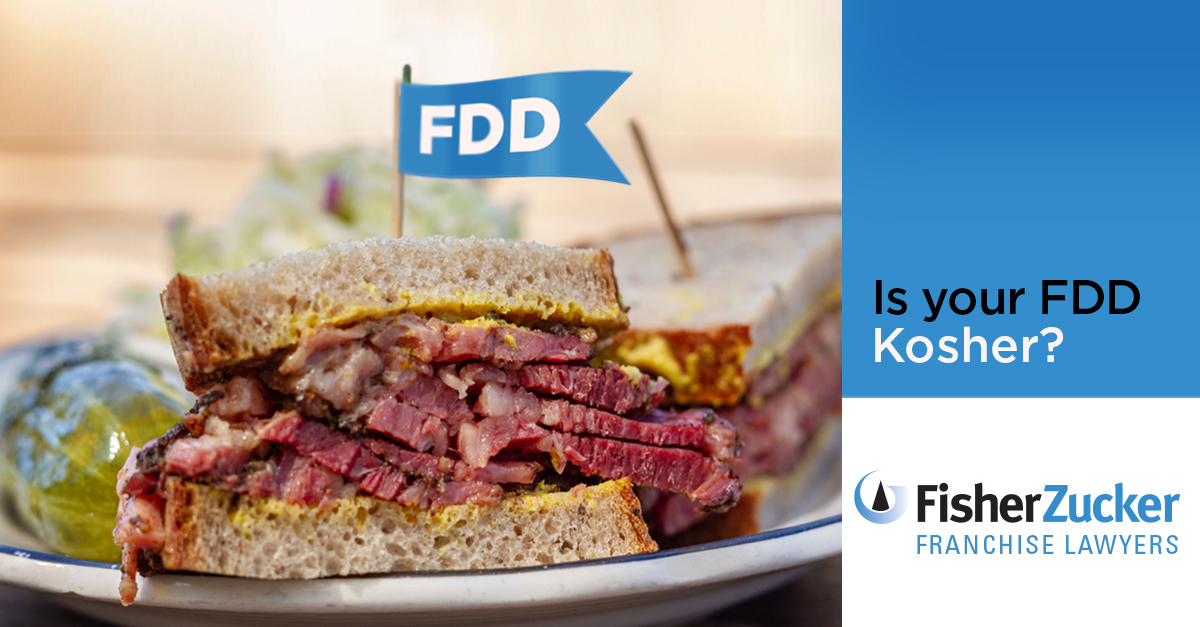Is Your Franchise Offering “Kosher” in the Registration States for 2023?
For those franchisors with a December 31st fiscal year end, the April 30th Franchise Disclosure Document (“FDD”) update deadline (March 31st in Hawaii and April 20th in California) is certainly creeping up pretty quick. And this year, in addition to the range of usual considerations when updating the FDD, franchisors planning to register in the so-called “registration states” must contend with two major new developments in franchise regulations.
First, the implementation on January 1st of NASAA’s Statement of Policy (the “SOP”) Regarding the Use of Questionnaires and Acknowledgements – which significantly limits the types of representations that franchise sellers can elicit from prospective franchisees during the sales process – has franchisors scrambling to determine how to both comply with the SOP and ensure their sellers (including brokers) are following the rules.
Second, California’s enactment of AB 676 – which overhauls key portions of both the California Franchise Relations Act (“CFRA”) and the California Franchise Investment Law (CFLI) – may have a substantial impact on the way franchisors do business in California in 2023.
For franchisors seeking to become registered in the registration states in 2023, it will be crucial to spend some time thinking about how these changes will impact their franchise offerings, including their annual FDD updates, franchise sales process, and ongoing relationships with existing franchisees. In this article, I briefly outline some of the more significant changes wrought by NASAA’s SOP and California’s AB 676. However, this article is not an exhaustive exploration of all such changes – as always, please reach out to us if you have any specific questions about your own franchise offering in 2023.
NASAA’s Statement of Policy Regarding the Use of Questionnaires and Acknowledgements
For years, many (if not most) franchisors have included a form of franchise sales compliance questionnaire as an Exhibit in the FDD in which the franchisor asks the purchasing franchisee to make certain representations, such as that the franchisee has read and understood the FDD, has not relied on any outside financial performance information not found in Item 19 of the FDD, or has had the opportunity to consult with professional advisers before purchasing the franchise. The questionnaires have become a valuable tool for franchisors; since sales are often a lengthy process involving many individuals, franchisors use the questionnaires to ensure that no employees, brokers or other third parties made improper statements or financial performance representations during the sales process, and they can also serve to protect franchisors from regretful franchisees who later claim to have been fraudulently induced into the purchase. These questionnaires have served to flesh out red flags and legal concerns in the franchise sales process before the franchisor signs off on the franchise agreement, thereby allowing the parties the opportunity to take corrective actions or to walk away from the transaction.
However, NASAA’s new policy – which took effect on January 1, 2023 – specifically forbids franchisors from asking franchisees to make these kinds of once-standard representations.
In explaining the rationale behind the SOP, NASAA wrote that state regulators have found these compliance questionnaires to be “replete with questions and representations that serve no legitimate purpose” and that in some cases require franchisees to “acknowledge identical facts and statements that the franchisee must acknowledge a second time in the franchisor’s franchise agreement.”
Accordingly, Franchisors are now prohibited from requiring franchisees to make any statement on a compliance questionnaire or acknowledgement that is (a) “subjective or unreasonable,” (b) would cause a reasonable prospective franchisee to surrender or believe they have surrendered their rights under federal or state law, (c) would have the effect of “shifting Franchisor’s disclosure duties” to the prospective franchisee, or (d) is otherwise prohibited under the SOP. The SOP goes on to list eleven (11) specific, non-exhaustive examples of prohibited statements, including:
-
- That the Prospect has read or understands the FDD or any attachments thereto, including the franchise or other agreement;
- That the Prospect understands or comprehends the risks associated with the purchase of the franchise;
- That the Prospect is qualified or suited to own and operate the franchise;
- That, in deciding to purchase the franchise, the Prospective franchisee has relied solely on the FDD and not on any other information, representations, or statements from other Persons or sources;
- That neither the Franchisor nor any Franchise seller has made any representation, including any financial performance representation, outside of or different from the FDD and attachments thereto;
- That the success or failure of the franchise is dependent solely or primarily on Franchisee;
- That the Franchisor bears no liability or responsibility for Franchisee’s success or failure;
- That reiterates or duplicates any representation or statement already made elsewhere in the FDD and attachments thereto;
- That the Prospect has had the opportunity to or has/has not actually consulted with professional advisors or consultants or other franchisees;
- That the Prospect agrees or understands that the Franchisor is relying on the Questionnaires, Acknowledgments, or similar documents, including to ensure that the sale of the franchise was made in compliance with state and federal law or that no unauthorized, inaccurate, or misleading statements were made; and
- That requires or suggests that the Prospect must complete any Questionnaires, Acknowledgments, or similar documents prohibited by this Statement of Policy or provide false answers as a condition to the purchase of the franchise.
Therefore, in order to fully comply with the SOP’s guidance, in all registration states a franchisor must (1) eliminate all Prohibited Statements in any pre-closing Questionnaire used in those states (or else remove the Questionnaire entirely) and scrub any similar statements in the franchise or development agreement, and (2) add the following newly required provision to any state specific addenda:
No statement, questionnaire, or acknowledgment signed or agreed to by a franchisee in connection with the commencement of the franchise relationship shall have the effect of (i) waiving any claims under any applicable state franchise law, including fraud in the inducement, or (ii) disclaiming reliance on any statement made by any franchisor, franchise seller, or other person acting on behalf of the franchisor. This provision supersedes any other term of any document executed in connection with the franchise.
In the event that a franchisor will still require franchisees to complete a compliance questionnaire (without any of the Prohibited Statements) before entering into a franchise agreement in any of the registration states, then such questionnaire must be referenced in Item 22 of the FDD and a proposed form of such questionnaire must be included as an exhibit to the FDD. If the franchisor requires the franchisee to “verbally respond” to any questionnaires via video or other electronic media before entering into a franchise agreement, then a written script of the proposed form of such questionnaire must be referenced in Item 22 of the FDD and attached as an exhibit to the FDD.
Given that the SOP only just became effective on January 1, 2023, no consensus has yet developed among franchisors (and their attorneys) as to how best to comply with the SOP.
In the meantime, franchisors should consult carefully with their attorneys to determine the best path forward to ensure minimal complications and/or delays during the registration process. Franchisors should also take this opportunity to thoroughly review their sales process and consider adding additional safeguards if necessary.
California’s AB 676
California’s AB 676 – which is now in effect and applies to any franchise agreement entered into, amended, or renewed on or after January 1, 2023 – makes significant changes to both the CFRA and the CFLI, the state’s foundational franchise laws.
Some notable changes include (a) a modification of the definition of when an “offer” or “sale” of a franchise is made in the state of California, (b) a prohibition on franchisors’ modification of a franchise agreement or requirement of a general release in exchange for any assistance related to a state or federal emergency, and (c) a prohibition on franchisors’ refusal to grant a franchise based on any characteristic of the composition of the neighborhood or geographic area where the franchise is located or the proposed franchise would be located (as listed or defined in California’s civil rights law).
However, perhaps the most notable changes wrought by California’s new law are those related to transfers of existing franchised businesses. Specifically, franchisors in California are now required to communicate directly with any prospective transferee who is contemplating purchasing an existing franchised business. A prospective transferee seeking to buy an existing franchised business, all or substantially all of the assets of an existing franchised business, or an interest in such franchised business, must do the following when submitting an application to the franchisor:
- Provide their name and address to the franchisor;
- Provide to the franchisor a copy of all agreements related to the sale, assignment, or transfer of the franchise, the assets of the franchised business, or the interest in the franchised business;
- Provide an application to the franchisor for approval of the transfer, which must include all forms, financial disclosures, and related information required by the franchisor in reviewing prospective franchisees;
- Additionally, if a form/document required to be submitted with an application is not reasonably available to the prospective franchisee, the prospective franchisee may make a written request to the franchisor for such form or document, and the franchisor must then deliver the form by email, courier, or certified mail within 15 calendar days of receiving the request; and
- If the franchisor’s then-existing standards for approval of any application are not reasonably available to the prospective franchisee, the prospective franchisee may make a written request for the standards to the franchisor, and the franchisor must communicate the standards within 15 calendar days of receiving the request.
Once the franchisor receives the application from the prospective franchisee, the franchisor must notify the prospective franchisee in writing – as soon as practicable after the receipt of the application – of any additional information or documentation necessary to complete the application. Furthermore, the franchisor must notify the prospective transferee in writing of the approval or disapproval of their application within 60 days after receiving all required information and documentation. If the application is disapproved, the franchisor must include in the notice a statement setting forth the reasons for the disapproval.
In addition to the transfer-related provisions described above, AB 676 codifies a modified version of NASAA’s SOP into California’s franchise law. Specifically, as of January 1, 2023, any provision of a Franchise Agreement, pre-sale compliance questionnaire, acknowledgment, or other writing that disclaims or denies any of the following are now deemed void and unenforceable under California law:
- Representations made by the franchisor or its personnel or agents to a prospective franchisee;
- Reliance by a franchisee on any representations made by the franchisor or its personnel or agents;
- Reliance by a franchisee on the FDD, including any exhibit thereto; and
- Violations of any provisions of the amended law.
Conclusion
The law and policy changes described above are likely to have significant impact on the offerings of thousands of franchisors across the country in 2023 and beyond, especially on those franchisors seeking to become registered in “registration states” and in California in particular. To the extent that franchisors have not already begun contemplating these changes and how they might best respond to them, they should do so now.
Finally, it is important to note here again that the information included above is not intended to be, nor is in fact, an exhaustive explanation of all changes made by NASAA’s SOP and by California’s AB 676. Any franchisor with questions about their specific offering or franchised business should contact us for more information and for assistance with ensuring their offering or business remains “kosher” in the registration states in 2023.
Back




